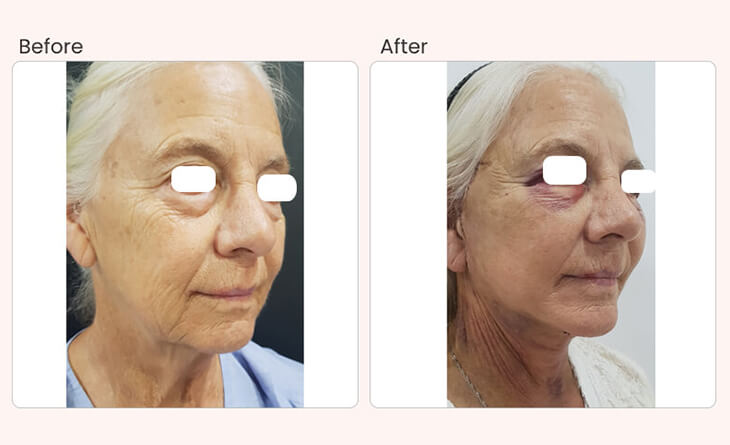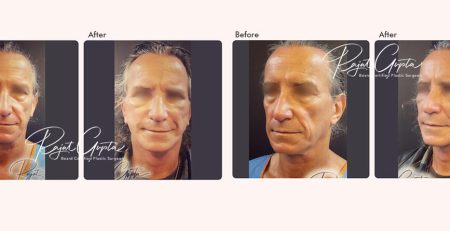Complete Guide to Facelift Facelift Surgery Procedure By Dr Rajat Gupta
Are you planning to undergo a facelift surgery procedure? Before getting a facelift, you must know a few things about the surgery.
The contour of the face changes with age, and the skin and tissues lose their elasticity, resulting in wrinkles and sagging. Thankfully, facelift surgery can help to lift and tighten facial tissues.
A facelift, also known as rhytidectomy, is a surgical procedure performed to improve the appearance of the face by reducing the signs of ageing. The procedure involves removing excess skin, tightening facial tissues, and smoothing wrinkles.
This article will tell us how to prepare for a facelift, what to expect during the process and post-operative care.
How to Prepare for a Facelift?
You have met the surgeon to have a facelift surgery in Delhi, picked the best technique and scheduled a date. Now, what next? It’s time to start preparing yourself for surgery and recovery. Preparation for facelift surgery is very important because it is an invasive procedure. Here are the tips to prepare for the facelift procedure.
Six weeks before surgery: If you smoke, you must quit at least six weeks before your facelift. Smoking can interfere with healing and increase the risk of complications. Also, keep your body hydrated and make sure that your body is receiving all the essential nutrients.
Two weeks before surgery: You should not take certain medications, including blood thinners like aspirin and anti-inflammatory drugs, two weeks before the facelift surgery procedure because these medications can increase the risks of bleeding and bruising during the surgery. Make sure you have arrangements for someone to take you home after the surgery and stay with you for at least 24 hours.
One week before surgery: By this time, you will have a final consultation with your surgeon. They will review the modifications that will be done during the procedure and address any additional questions. Ensure you have everything you need for the first few days after the surgery, including any prescribed medications, ice packs, gauze, and bandages.
The night before surgery: Get a good night’s sleep to help you feel rested and prepared for the facelift surgery procedure. Choose comfortable, loose-fitting clothing to wear after the surgery, and avoid clothes with buttons or zippers that may be difficult to wear after the procedure. Gather all necessary supplies to ensure your home is ready for recovery.
You should not eat anything after midnight the night before facelift surgery in Delhi because anaesthesia can only be given on an empty stomach. Allow a ride from home to attend you to the hospital. Relax and get ready for your facial rejuvenation.

Have questions or want to get started? We are ready to help you with a smile!
What to Expect During the Procedure?
A facelift procedure typically takes between two and four hours to complete, depending on the complexity of the treatment and the technique used by the surgeon. Facelift surgery is performed under anaesthesia. Here’s a general overview of what you can expect during a facelift surgery in Delhi:
Anaesthesia: Facelift surgery is generally performed under general anaesthesia or light sedation. The type of anaesthesia used during your facelift procedure depends on your surgeon’s recommendation, type of procedure and medical history.
The incision: During the procedure, your surgeon will make incisions in the strategic location around the face to minimise scarring and achieve natural-looking results.
Many different techniques are used for a facelift, and the specific incisions will depend on the particular needs and goals of the patient. Generally, the incisions are made in the hairline temples, in front of the ear or behind the ear.
The incisions for the facelift surgery procedure may be relatively short, discreet, or longer, depending on the extent of the surgery. In some cases, additional incisions may be made under the chin or along the lower eyelid to address sagging or excess skin in those areas.
It’s important to follow your surgeon’s instructions carefully after the surgery to help the incisions heal properly and minimise scarring. Your surgeon will provide specific instructions on caring for the incisions, including cleaning them and protecting them from sun exposure.
The procedure itself: The surgeon will then lift and reposition the underlying tissues and muscles to create a more youthful and refreshed appearance. Facelift surgery in Delhi typically involves tightening the skin and underlying muscles to smooth out wrinkles and sagging, as well as repositioning fat or other tissues to improve the contours of the face.
The specific techniques used and the extent of the tightening and repositioning will depend on the individual patient’s needs and the goals of the procedure. The surgeon will carefully assess the patient’s facial anatomy and skin quality to determine the most appropriate approach.
After the procedure: After the facelift procedure is complete, the surgeon will close the incisions using stitches or staples. The type of suture material and technique used will depend on the location and size of the incisions, as well as the surgeon’s preference and the patient’s specific needs.
Recovery: After the facelift surgery procedure, you need to take some time to rest and recover. You may experience swelling, bruising, and discomfort for a few days or weeks. Most patients return to their normal activities within a few weeks, but it can take several months for the final results to develop fully. Your surgeon will provide specific instructions on how to care for your incisions and manage any discomfort.
Post Operative Care
A facelift is an invasive surgery that requires post-operative care. Therefore, you must follow your surgeon’s instructions for quick healing and achieve the desired outcome. Here are some general guidelines for facelift surgery procedure post-operative care.
Take proper rest: It is important to take appropriate rest to help your body heal properly and minimise the risk of complications. Ask someone to stay with you for the first 24 hours for light activities.
Take prescribed medications: You can feel pain or discomfort for a few hours or days. In that case, your surgeon will prescribe medications to manage the discomfort. You must take these medications as directed to control the pain.
Avoid strenuous activities: After a facelift, you should avoid strenuous activities such as lifting heavy objects, bending over, and exercising for at least two weeks. This will help to prevent strain on the surgical incisions and allow the tissues to heal properly. Dr Rajat Gupta, a board-certified plastic surgeon, will provide specific guidelines on when it is safe to resume these activities.
Keep your head elevated: You can experience swelling and bruising after the facelift procedure. Therefore, you must keep your head elevated for the first few days after surgery to help reduce swelling and bruising. You can do this by using a few extra pillows or sleeping in a reclining chair.
Apply ice packs: Your surgeon may recommend applying ice packs to your face and neck to help reduce swelling and discomfort. Be sure to wrap the ice packs in a towel to avoid direct contact with your skin.
Keep your incisions clean: Keeping your incisions clean and dry is important to prevent infection. Dr Rajat Gupta will provide specific instructions on caring for your incisions, applying ointment or dressings, and avoiding activities that may cause the incisions to stretch or become strained.
Protect your skin from the sun: After a facelift, your skin will be more sensitive to the sun’s rays. It is important to protect your skin by wearing a broad-spectrum sunscreen with an SPF of 30 or higher and a wide-brimmed hat when you are outside.
Avoid smoking: Smoking can result in necrosis or tissue death, infection, poor healing, scarring, and many other severe side effects. Therefore, you should avoid smoking for a few weeks after a facelift surgery procedure.
Don’t use makeup: Don’t apply makeup for the first 10 days. When you begin wearing make-up, avoid heavy, strong brands since the pigment may accumulate in the incisions and scars.
Wear compression garments: Dr Rajat Gupta may recommend wearing a compression garment or elastic bandage around your face and neck to help reduce swelling and promote healing.
Attend follow-up appointments: It is important to attend all follow-up appointments with your surgeon as scheduled. These visits allow your surgeon to monitor your progress and address any concerns you may have.
Following your surgeon’s post-operative care instructions and taking good care of yourself can help ensure a smooth recovery after your facelift surgery.
Wrapping Up!
A facelift surgery procedure is an excellent option for anyone looking to reduce the signs of ageing in their face. It can result in dramatic improvements in facial appearance and can be used to treat various issues, such as sagging skin, wrinkles, and jowls.
While it is a safe and effective procedure, it is still important to understand all the risks involved. Choose a qualified and experienced plastic surgeon who performs facelifts. Be sure to discuss your expectations and the potential risks and complications of the procedure with your surgeon to ensure that you get the best outcome possible.
Dr Rajat Gupta is a board-certified plastic surgeon based in Delhi, India. He specialises in aesthetic and reconstructive procedures of the face, body and breasts. He will discuss the facelift procedure’s risks and complications and guarantee that the results are natural-looking.
Dr. Rajat Gupta
MBBS, MS, DNB(Gen. Surg.),
DNB (Plastic Surgery)
Dr. Rajat Gupta is a board certified plastic surgeon in India with 18+ years of experience to back his expertise in the domain of aesthetic surgeries.
Having completed his training from Maulana Azad Medical College and equipped with a thorough understanding of aesthetic needs of people, Dr. Gupta strives to offer the best remedies and cosmetic procedures outfitted with the latest technology to the aspirants in India and across the globe. To book an appointment, call: +91-9251711711 or email: contact@drrajatgupta.com













